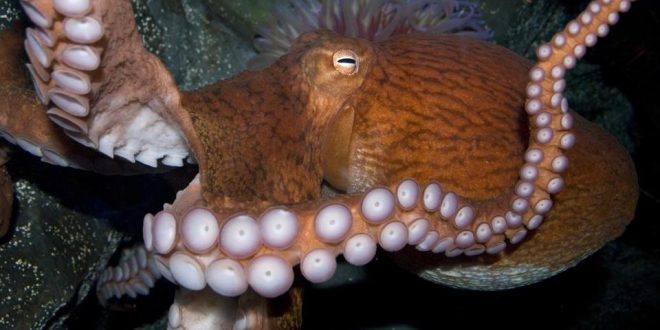Cephalopods thrive in warm oceans? Warming oceans are bad news for a number of marine species, but cephalopods — the many-armed mollusk group that includes octopus, squid and cuttlefish — are doing just fine. In fact, over the past 60 years their numbers have been on the rise, according to a new study.
The international team, led by researchers from the University’s Environment Institute, compiled a global database of cephalopod catch rates to investigate long-term trends in abundance, published in Cell Press journal Current Biology.
“Our analyses showed that cephalopod abundance has increased since the 1950s, a result that was remarkably consistent across three distinct groups,” says lead author Dr Zoë Doubleday, Research Fellow in the Environment Institute and School of Biological Sciences.
“Cephalopods are often called ‘weeds of the sea’ as they have a unique set of biological traits, including rapid growth, short lifespans and flexible development. These allow them to adapt to changing environmental conditions (such as temperature) more quickly than many other marine species, which suggests that they may be benefiting from a changing ocean environment.”
Dr Doubleday says the research stemmed from an investigation of declining numbers of the iconic Giant Australian cuttlefish.
“There has been a lot of concern over declining numbers of the iconic Giant Australian cuttlefish at the world-renowned breeding ground in South Australia’s Spencer Gulf,” Dr Doubleday says. “To determine if similar patterns were occurring elsewhere, we compiled this global-scale database. Surprisingly, analyses revealed that cephalopods, as a whole, are in fact increasing; and since this study, cuttlefish numbers from this iconic population near Whyalla are luckily bouncing back.”
Project leader Professor Bronwyn Gillanders says large-scale changes to the marine environment, brought about by human activities, may be driving the global increase in cephalopods.
“Cephalopods are an ecologically and commercially important group of invertebrates that are highly sensitive to changes in the environment,” Professor Gillanders says. “We’re currently investigating what may be causing them to proliferate – global warming and overfishing of fish species are two theories. It is a difficult, but important question to answer, as it may tell us an even bigger story about how human activities are changing the ocean.”
Cephalopods are found in all marine habitats and, as well as being voracious predators, they are also an important source of food for many marine species, as well as humans.
“As such, the increase in abundance has significant and complex implications for both the marine food web and us,” says Dr Doubleday.
Agencies/Canadajournal

 Canada Journal – News of the World Articles and videos to bring you the biggest Canadian news stories from across the country every day
Canada Journal – News of the World Articles and videos to bring you the biggest Canadian news stories from across the country every day


Some of the most innovatively adapted invertebrates belong to class Cephalopoda, Greek for “head-footed.” Over 700 species of cephalopods have been identified, and they are divided into the subclasses Coleoidea (cuttlefish, squid, and octopus) and Nautiloidea (nautiluses).
Cephalopods inhabit all of the world’s oceans and occur at a wide range of depths, from ocean bottoms (benthic species) to open waters (pelagic species). They are also diverse in size, ranging from the centimeters-long Californian octopus (Octopus micropyrsus) to giant squid (Architeuthis), some of which measure over 18 meters long.
Like other molluscs cephalopods have got a radula or rasp tongue to rasp their food to pieces. In addition to that they also have a beak made out of horn, like that of a parrot, with which the prey is cut to pieces before being swallowed. The beak can also serve to crack open the prey’s armour, as many cephalopods’ favourite food are crustaceans.
I also learned that “octopuses” is the correct plural form of octopus. I had previously thought it was “octopi”.